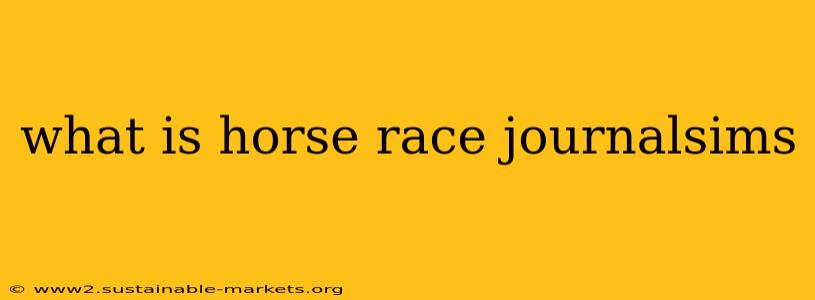Horse race journalism. The term itself conjures up images of breathless reporters, constantly updating the public on the shifting odds in a political campaign. But it's more than just tracking poll numbers; it's a pervasive style of political coverage with both strengths and significant weaknesses. This article delves into the heart of horse race journalism, exploring its mechanics, its impact, and its alternatives.
Defining Horse Race Journalism: Beyond the Numbers
At its core, horse race journalism focuses on the competition aspect of a political campaign rather than on the candidates' policies, platforms, or qualifications. Instead of in-depth analysis of issues, it prioritizes tracking polls, fundraising totals, and campaign strategy – essentially, who's ahead and who's falling behind. This often manifests as a constant stream of updates on minute shifts in public opinion or campaign funding, creating a narrative of winners and losers rather than a substantive discussion of governance.
Think of it as reporting on a horse race: the focus is less on the individual qualities of each horse and more on their relative positions in the race. This approach, while seemingly simple, can significantly shape public perception and influence the outcome of elections.
Key Characteristics of Horse Race Journalism:
- Emphasis on polls and rankings: Constant updates on poll numbers and standings dominate the narrative.
- Strategic maneuvering as the main focus: The story centers around campaign tactics, fundraising efforts, and media appearances rather than substantive policy debates.
- "He said, she said" reporting: Often relies on quotes from campaign officials or talking heads, lacking in-depth policy analysis.
- Lack of context and historical perspective: Rarely provides historical context or a broader understanding of the issues at hand.
- Focus on short-term gains: Driven by the immediate news cycle, overlooking the long-term implications of policy decisions.
The Impact of Horse Race Journalism: A Double-Edged Sword
While horse race journalism provides a readily digestible summary of campaign dynamics, its impact is far from neutral.
Potential Benefits:
- Increased public engagement: The competitive nature can grab attention and encourage viewers to follow the campaign.
- Accountability (to an extent): Tracking fundraising and campaign activities can reveal potential ethical breaches or financial irregularities.
- Accessibility: Provides a simplified overview of campaign events for those unfamiliar with political intricacies.
Significant Drawbacks:
- Oversimplification of complex issues: Reduces nuanced debates to simplistic win/lose scenarios, neglecting the complexities of policy.
- Distraction from substantive policy discussion: Shifting focus from policy to strategy can lead to superficial coverage.
- Reinforcement of negativity and division: Emphasis on competition and conflict can intensify political polarization.
- Disengagement of voters: The focus on strategy and polls rather than issues can discourage voters from engaging with the political process.
- Bias and manipulation: Media outlets can influence the narrative through selective reporting or framing of poll results.
Beyond the Race: Alternatives to Horse Race Journalism
Thankfully, alternatives exist. High-quality political journalism should prioritize:
- In-depth policy analysis: Providing detailed explanations of candidates' stances on key issues.
- Fact-checking and verification: Ensuring accuracy and combating misinformation.
- Investigative reporting: Uncovering potential corruption or hidden agendas.
- Long-term perspective: Analyzing campaign dynamics within a broader historical and societal context.
- Voter education: Providing information to empower voters to make informed decisions.
By shifting the focus from the "race" to the substance of political discourse, journalists can foster a more informed and engaged citizenry. Rejecting the simplistic narrative of horse race journalism is essential for cultivating a healthy democracy.

